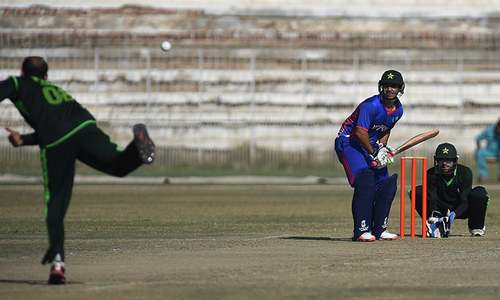Pakistan's batsmen have never quite enjoyed genuine pace bowling.
It's been a journey of helpless blocking and premeditated strokes which have often resulted in almighty collapses. With bowlers like Fazal Mahmood, Imran Khan, Wasim Akram, Waqar Younis, Shoaib Akhtar and now Mohammad Irfan and Wahab Riaz bowling at them in the nets, it is a wonder that they haven't improved overtime.
Pakistan’s recent shorter format outings turned out to be a disaster as the Englishmen razed over the hosts to complete an emphatic 0-3 whitewash in the T20s.
The batsmen struggled against the visitors’ quality fast bowling often losing 2-3 wickets in the first three overs. In the last game, the hosts had Ahmed Shehzad and one-down Mohammad Hafeez back in the pavilion even before the first over had ended.
Hafeez, considered by many as a bowling all-rounder, has probably had it the toughest and his woes always take you back to the time when South Africa’s star paceman Dale Steyn made him look like a schoolboy.
The South African quick dismissed the right-handed batsman 12 times in 15 encounters. No other batsman has been dismissed by a particular bowler this many times. In 2013 alone, Steyn removed Hafeez 10 times, four times in Tests and ODIs and twice in T20s.
Last year’s World Cup story was no different with the opposition pacers doing damage early in the games. Pakistan lost the openers within the first 10 overs regularly.

In the group stage game against the West Indies, Jerome Taylor ripped through Pakistan’s top and middle order. At one stage Pakistan were 4 down for just 1 run, Taylor picking three of them. The team’s batting woes remained part of heated discussions among fans and analysts throughout the World Cup.
Now Pakistan are in New Zealand and the fears were the same before the team embarked on the tour.
How will our batsmen counter the short-pitched stuff from Trent Boult, Matt Henry and Adam Milne?
Things appeared to be following the age-old pattern at Eden Park in Auckland yesterday when the most feared side in limited overs cricket won the toss and put Pakistan in.
Shahid Afridi's men had arrived in New Zealand just four days ago and did not opt for any practice game to get used to the conditions.
The last time we were in New Zealand was one year ago just before World Cup.
Pakistan being put to bat first meant that they needed to put something sizable on the board to challenge New Zealand's hard-hitters.
Would Shehzad and Hafeez be up for it?
Opening an innings is a demanding job. The whole bunch depends on you to provide the right start. As an opener, you have to take the punches of the opposition’s best bowlers and see off the new ball.
The groundsmen at Eden Park had shaved off the drop-in wicket to generate pace and bounce off the wicket, something which would have definitely send shivers in the Pakistan dressing room.
Hafeez usually fails on such tracks and is often labeled as a flat track bully.

But to everybody’s surprise, it was Hafeez’s phenomenal batting that put us in a commanding position and ultimately set the tone of the game from the very beginning. His well-constructed innings comprising calculated gear shifting and timely counterpunches provided us with the upper hand.
Of late Pakistan batsmen have been rushing to score runs. In the process, they have done everything but score. They have played the silliest of the strokes and gotten out in the most bizarre fashion.
With no prior practice Hafeez faced the first ball and let it fly past him. He calmly read the wicket’s pace and bounce and continued to do so for the next seven deliveries.
After the professor mastered the wicket’s behavior, he unleashed himself on the ninth delivery that he faced with an exquisite square-cut off Trent Boult for a boundary.
He eased his way through the powerplay overs, hitting seven boundaries in all. Most of them coming in Corey Anderson’s only over, the sixth, when he struck 18 runs (4, 4, 0, 6, 0, 4), which also helped Pakistan get into a momentum.
As the powerplay ended, Hafeez took his foot off the gas for the next three overs as the Kiwi captain – Kane Williamson – brought on the spinners.
Pakistan batsmen are quite famous for their inability to sneak singles. In Asian conditions, it is always easier to score boundaries due to the low-bounce. So, Hafeez had to adjust to the conditions and nudged singles off Mitchell Santner and Todd Astle’s turn and sharp bounce.
In the meantime, veteran Shoaib Malik freed his arms at the other end, while Hafeez played the crucial role of a strike rotator. When our innings arrived at the half-way mark, Malik was back in the pavilion, but Hafeez counterpunched with a six over midwicket off Astle.
He stroked his way to reach 50* in 36 deliveries – his first in over two years, before getting caught on 61, smashing eight fours and two sixes in his 47-ball knock.
Hafeez’s mature knock helped Pakistan set a staggering total of 171, making it the team’s twenty-fourth 170 plus score.
As Hafeez stood firm through the tough initial part and acclimatized to the conditions, his mature and elegant approach helped in removing his fragility from the equation.
This innings by Hafeez serves as a coaching manual for rest of the Pakistani batters.
The key to success on the New Zealand tour will be Hafeez-like batsmanship. The batsmen will have to stick to the basics and allow themselves to settle in before going for the kill.

















































